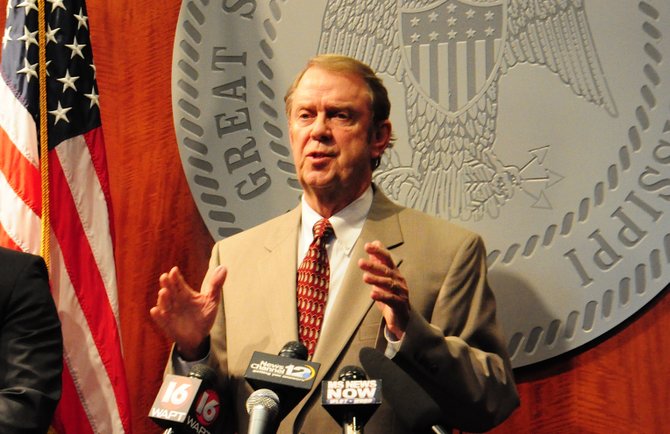Mike Chaney discussed HHS denial at a press conference in the Woolfolk building in Jackson, Miss. February 7, 2013. Photo by Trip Burns.
Mississippi Insurance Commissioner Mike Chaney said he feels the Obama administration has betrayed him for denying the state's application to set up a health-insurance exchange under the Affordable Care Act.
"I'm sorely disappointed in the denial," Chaney said at a hastily assembled press conference late this afternoon. The call from the U.S. Department of Health and Human Services came about 3:30 p.m.
Chaney indicated that his office has been working on setting up an exchange for the past three and a half years. Mississippi started a free-market insurance exchange under former Gov. Haley Barbour, and Chaney said that Mississippi was farther along than any other state toward completion.
"The denial of HHS … speaks volumes," he added, saying that the intentions of the federal government are "not something that I like."
Chaney speculated that HHS believes the political atmosphere in the state is not conducive to having Mississippi run its own exchange, Chaney said, but did not elaborate. Other than that, he would not hypothesize why his department's application was denied. Chaney said he expects the official letter from the government later tonight or tomorrow. That letter will provide specifics of the denial.
"We have given our best efforts to protect the people of Mississippi," Chaney told reporters, and indicated that he would be willing to share the technology Mississippi has developed so far--at a cost to the federal government of $4.5 million--with other states.
"I think HHS was much more upset than I was," he said. "The decision came from the very top."
Chaney said he believes the federal agency was "mortified" by the decision.
The commissioner also said that he expects the effects on the state to be "draconian in nature," and that health-insurance rates would double or triple under federal control.
Jameson Taylor, vice president for policy at the Mississippi Center for Public Policy, indicated to the Jackson Free Press after the press conference that Chaney's claim was probably somewhat hyperbolic.
"It's not as if HHS is coming in and nullifying every state's insurance laws," he said. What will happen with a federal exchange is that insurance companies that do not operate in the state now will give in-state companies additional competition.
"I don't have any evidence that that would be true," he said of Chaney's claim of rates doubling or tripling. "… I don't know where that number is coming from."
"There is not an essential difference between a federal exchange and a state exchange," Taylor said, other than with a state exchange, the state would be "on the hook" for doing all the work for the feds. He added that this is one reason the MCPP has been opposed to state exchanges all along. "We haven't seen the distinction between the two," he said.



Comments
Use the comment form below to begin a discussion about this content.